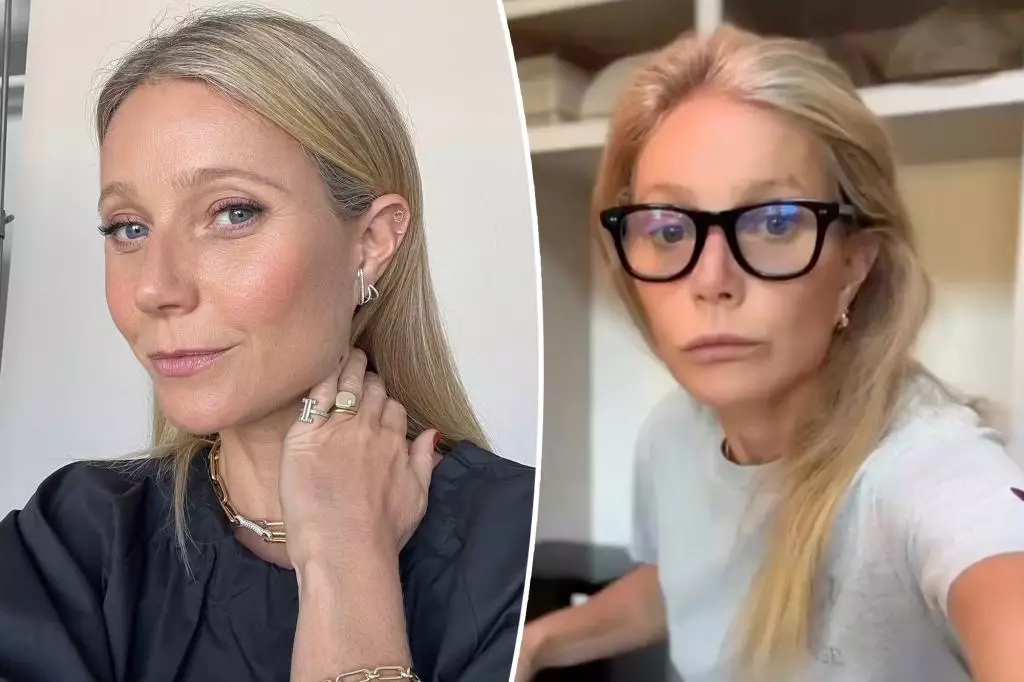In recent years, societal expectations surrounding beauty have grown increasingly rigid, compelling individuals—especially women—to adhere to idealized physical standards. The case of Gwyneth Paltrow, a celebrated actress and lifestyle icon, exemplifies this dilemma. Despite her career longevity and status as a symbol of sophistication, Paltrow’s recent appearance has ignited controversy—her fuller lips in a casual cooking video have ruffled feathers and prompted scrutiny about authenticity and personal choice. It exposes a larger issue: how modern culture equates beauty with youth and flawlessness, often at the expense of honesty about cosmetic procedures.
What strikes me most is the way social media amplifies this pressure. Fans and critics alike scrutinize Paltrow’s evolving look, jumping to conclusions about her appearance without understanding her personal motivations or choices. Online platforms tend to reinforce a narrow standard of beauty, often demonizing any departure from the perceived “natural.” This environment discourages transparency, pushing celebrities to either deny changes or face relentless judgment. Yet, it also underscores society’s obsession with perfection, particularly when public figures sell products or endorse a certain lifestyle.
The controversy surrounding Paltrow’s lips, for example, suggests a deeper discomfort with aging and cosmetic intervention. Instead of embracing the natural process or openly discussing improvements, many feel compelled to criticize or speculate. Such reactions reflect an inherent double standard: genuine confidence and acceptance of aging are praised, yet any effort to look youthful or refreshed is often met with suspicion or mockery. This cultural hypocrisy not only damages individual self-esteem but perpetuates an environment where honesty becomes a risky declaration.
Balancing Personal Agency and Social Perception
Gwyneth Paltrow’s openness about her history with injectables, like Xeomin and Botox, highlights a nuanced reality. She has publicly admitted to the benefits and pitfalls of cosmetic procedures, illustrating that personal choices about physical appearance are complex and not inherently superficial. Her candidness could be a step toward destigmatizing the conversation around aesthetic enhancements, which are often shrouded in shame or secrecy.
However, her recent appearance challenges the narrative of authenticity. Are these cosmetic adjustments a betrayal of genuine self-acceptance? Or are they simply a reflection of individual agency in a society that often feels bound by unrealistic standards? It is important to recognize that personal decisions about one’s body should be respected, regardless of whether they involve enhancements or not. The real issue lies in the societal tendency to police women’s appearances and judge their choices harshly—highlighted by the barrage of comments about Paltrow’s lips.
Critically, this scenario underscores the importance of shifting the focus from appearance to self-love. Contrary to what the criticism suggests, the pursuit of aesthetics is deeply personal, and dismissing it as vanity diminishes individual autonomy. Societies need to evolve into environments where honesty about cosmetic procedures is normalized, and differences in appearance are celebrated rather than condemned. Only then can we truly foster a culture that encourages authenticity over superficial perfection.
Challenging the Gendered Double Standard
An underlying factor in these discussions is the gendered nature of beauty scrutiny. Women, especially those in the limelight, are expected to look a certain way—youthful, flawless, and devoid of signs of aging. When a woman modifies her appearance, she faces disproportionate judgment, often labeled as vain or insecure. Conversely, men who opt for similar procedures face less scrutiny or ridicule, revealing a double standard rooted in gender stereotypes.
Gwyneth Paltrow’s experience reflects this disparity. Her willingness to discuss her use of injectables demonstrates vulnerability and honesty—a stark contrast to the typical societal expectation that women must appear effortlessly perfect. Yet, she still encounters negativity. Such reactions reveal that societal standards are not just about beauty but about policing women’s behavior and choices in ways that serve patriarchal or societal norms.
Establishing a culture of acceptance requires challenging these ingrained double standards. It demands that society recognize the importance of respecting personal decisions and refrains from policing women’s appearances. Embracing diversity in aesthetic choices, and understanding that beauty is multifaceted and subjective, could transform how we perceive ourselves and others. Ultimately, it is about fostering a mindset that values authenticity and personal happiness above societal approval or superficial standards.
—
The conversation about Gwyneth Paltrow’s appearance is more than just a superficial critique; it is a reflection of deeper societal issues regarding beauty, authenticity, and personal agency. As we navigate a world saturated with images and expectations, cultivating a culture that celebrates honesty and individual choice becomes imperative. Only then can we begin to dismantle the harmful standards that undermine genuine self-acceptance and embrace a more inclusive, empathetic understanding of beauty.


Leave a Reply